Serving 495 students in grades Prekindergarten-8, Ward J Elementary School ranks in the top 50% of all schools in Illinois for overall test scores (math proficiency is top 30%, and reading proficiency is top 30%).
The percentage of students achieving proficiency in math is 35% (which is higher than the Illinois state average of 28%). The percentage of students achieving proficiency in reading/language arts is 25% (which is lower than the Illinois state average of 30%).
The student:teacher ratio of 16:1 is higher than the Illinois state level of 13:1.
Minority enrollment is 95% of the student body (majority Asian), which is higher than the Illinois state average of 55% (majority Hispanic and Black).
Quick Stats (2025)
- Grades: Prekindergarten-8
- Enrollment: 495 students
- Student:Teacher Ratio: 16:1
- Minority Enrollment: 95%
- Overall Testing Rank: Top 50% in IL
- Math Proficiency: 35% (Top 30%)
- Reading Proficiency: 25% (Btm 50%)
- Science Proficiency: 50-54% (Top 50%)
- Source: National Center for Education Statistics (NCES), IL Dept. of Education
Top Rankings
Ward J Elementary School ranks among the top 20% of public schools in Illinois for:
Category
Attribute
Percent Eligible For Free Lunch
School Overview
Ward J Elementary School's student population of 495 students has declined by 10% over five school years.
The teacher population of 31 teachers has stayed relatively flat over five school years.
Grades Offered
Grades Prekindergarten-8
Total Students
495 students
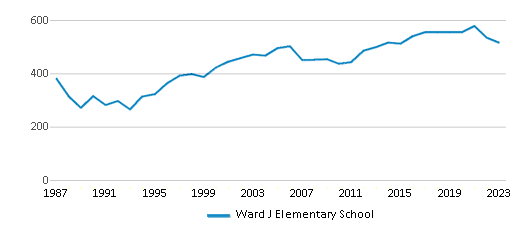
Gender %
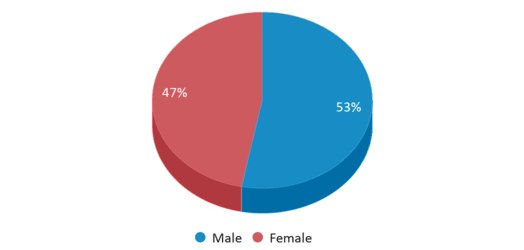
Total Classroom Teachers
31 teachers
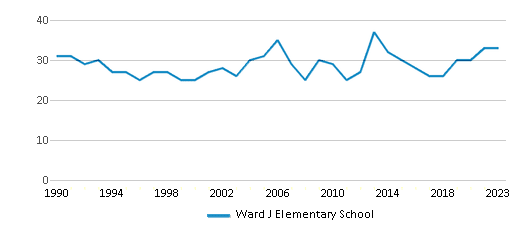
Students by Grade
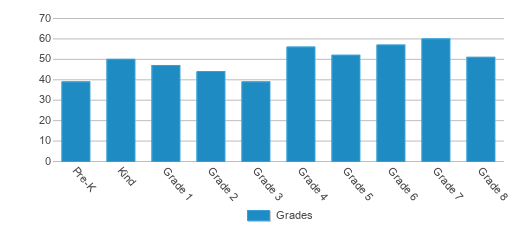
School Rankings
Ward J Elementary School ranks within the top 50% of all 3,426 schools in Illinois (based off of combined math and reading proficiency testing data).
The diversity score of Ward J Elementary School is 0.39, which is less than the diversity score at state average of 0.70. The school's diversity has stayed relatively flat over five school years.
Overall Testing Rank
#1278 out of 3426 schools
(Top 50%)
(Top 50%)
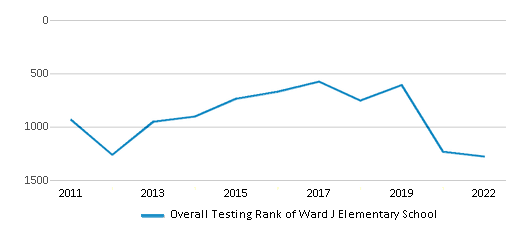
Math Test Scores (% Proficient)
(20-21)35%
28%
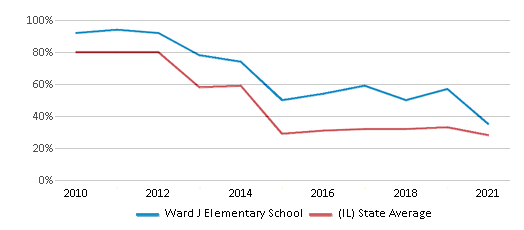
Reading/Language Arts Test Scores (% Proficient)
25%
30%
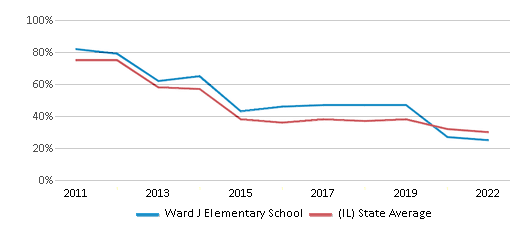
Science Test Scores (% Proficient)
50-54%
50%
Student : Teacher Ratio
16:1
13:1
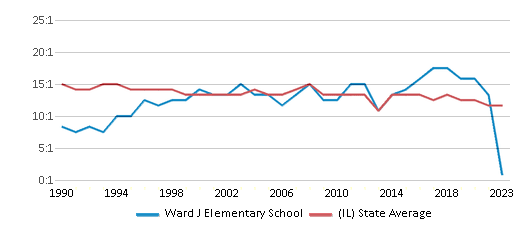
American Indian
n/a
1%
Asian
77%
6%
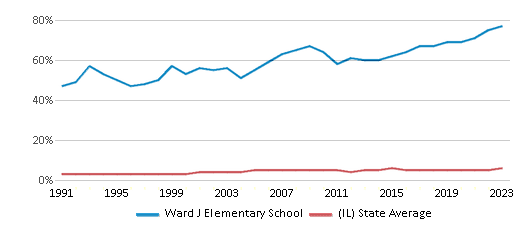
Hispanic
10%
28%
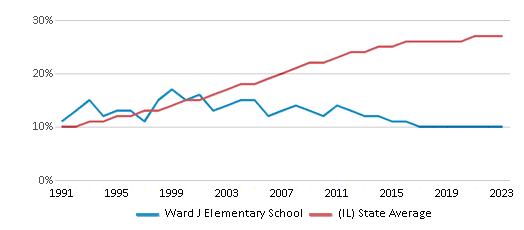
Black
7%
16%
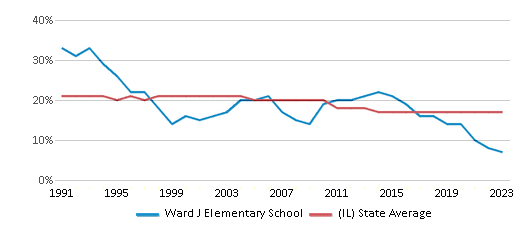
White
5%
45%
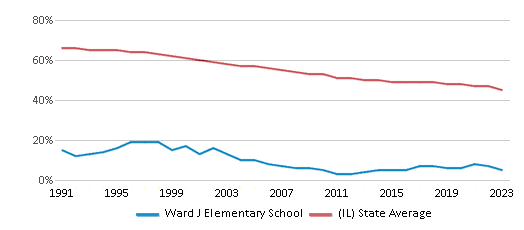
Hawaiian
n/a
n/a
Two or more races
1%
4%
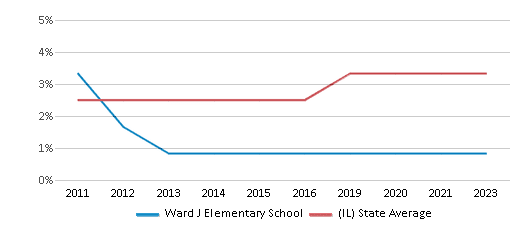
All Ethnic Groups
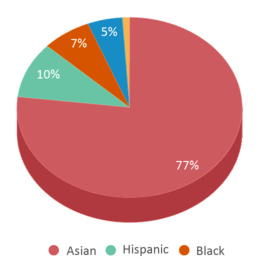
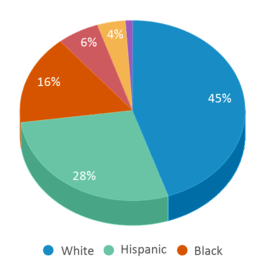
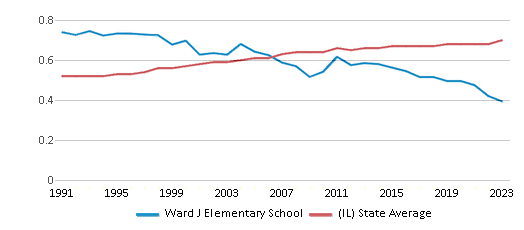
Eligible for Free Lunch
93%
43%
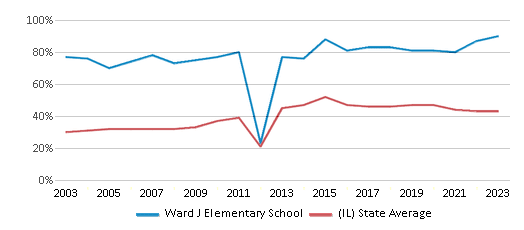
Eligible for Reduced Lunch (13-14)
8%
3%
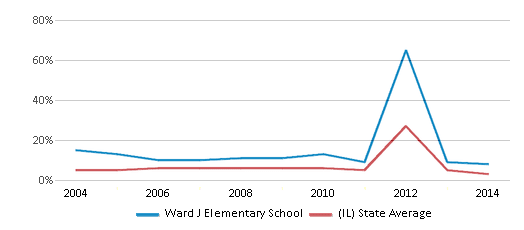
School Statewide Testing
School District Name
Source: National Center for Education Statistics (NCES), IL Dept. of Education
Profile last updated: 02/09/2025
Frequently Asked Questions
What is Ward J Elementary School's ranking?
Ward J Elementary School is ranked #1278 out of 3,426 schools, which ranks it among the top 50% of public schools in Illinois.
What schools are Ward J Elementary School often compared to?
Ward J Elementary Schoolis often viewed alongside schools like Healy Elementary School, Sheridan Elementary Math & Science Academy by visitors of our site.
What percent of students have achieved state testing proficiency in math and reading?
35% of students have achieved math proficiency (compared to the 28% IL state average), while 25% of students have achieved reading proficiency (compared to the 30% IL state average).
How many students attend Ward J Elementary School?
495 students attend Ward J Elementary School.
What is the racial composition of the student body?
77% of Ward J Elementary School students are Asian, 10% of students are Hispanic, 7% of students are Black, 5% of students are White, and 1% of students are Two or more races.
What is the student:teacher ratio of Ward J Elementary School?
Ward J Elementary School has a student ration of 16:1, which is higher than the Illinois state average of 13:1.
What grades does Ward J Elementary School offer ?
Ward J Elementary School offers enrollment in grades Prekindergarten-8
What school district is Ward J Elementary School part of?
Ward J Elementary School is part of Chicago Public Schools Dist 299 School District.
In what neighborhood is Ward J Elementary School located?
Ward J Elementary School is located in the Armour Square neighborhood of Chicago, IL. There are 2 other public schools located in Armour Square.
School Reviews
5 9/29/2009
Despite the school being the oldest educational facilty in Chicago, Ward carries a good reputation for limited crime, residing itself on the safe boundries of Chinatown. The population mostly consists of Asians, most repectively, Chinese. Most of the faculty offers an intense learning experience. The school is somewhat small compared to others (500+), but the school offers various opportunities and activities. It is how one considers his choices that stands in the matter of his success. Talented students in the academic or physical areas have their choices. Academic competitions (i.e. Academic Bowl, Math Team, etc.) have placed good marks in Area and City competitions, while the athletic teams have beaten down many of its stronger opponents. Level of parent involvement is pretty good, as there are Meet the Teachers Night's, Family Reading Night, etc.; however, there are still space for improvement on updating the school's website more often. Overall, I love this school. It has given me memories and nourishment of which I will never grow out. I now think of school as not only a development for life but life itself. I strongly recommend going to this school, especially because of the fact that it offers Spanish enrichment in its curriculum. I will never have any regret of choosing this school instead of Haines.
~ Yongming Deng, Class of 2010 :)
Review Ward J Elementary School. Reviews should be a few sentences in length. Please include any comments on:
- Quality of academic programs, teachers, and facilities
- Availability of music, art, sports and other extracurricular activities
Recent Articles

What Is A Charter School?
Explore the world of charter schools in this comprehensive guide. Learn about their history, how they operate, and the pros and cons of this educational innovation. Discover key facts about charter schools, including admission policies, demographics, and funding, as well as what to look for when considering a charter school for your child.

10 Reasons Why High School Sports Benefit Students
Discover the 10 compelling reasons why high school sports are beneficial for students. This comprehensive article explores how athletics enhance academic performance, foster personal growth, and develop crucial life skills. From improved fitness and time management to leadership development and community representation, learn why participating in high school sports can be a game-changer for students' overall success and well-being.

February 05, 2025
Understanding the U.S. Department of Education: Structure, Impact, and EvolutionWe explore how the Department of Education shapes American education, from its cabinet-level leadership to its impact on millions of students, written for general audiences seeking clarity on this vital institution.





